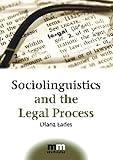Sociolinguistics and the Legal Process / Diana Eades.
Material type: TextSeries: MM TextbooksPublisher: Bristol ; Blue Ridge Summit : Multilingual Matters, [2010]Copyright date: ©2010Description: 1 online resource (320 p.)Content type:
TextSeries: MM TextbooksPublisher: Bristol ; Blue Ridge Summit : Multilingual Matters, [2010]Copyright date: ©2010Description: 1 online resource (320 p.)Content type: - 9781847692542
- 9781847692559
- 340.14 22
- K50
- online - DeGruyter
| Item type | Current library | Call number | URL | Status | Notes | Barcode | |
|---|---|---|---|---|---|---|---|
 eBook
eBook
|
Biblioteca "Angelicum" Pont. Univ. S.Tommaso d'Aquino Nuvola online | online - DeGruyter (Browse shelf(Opens below)) | Online access | Not for loan (Accesso limitato) | Accesso per gli utenti autorizzati / Access for authorized users | (dgr)9781847692559 |
Browsing Biblioteca "Angelicum" Pont. Univ. S.Tommaso d'Aquino shelves, Shelving location: Nuvola online Close shelf browser (Hides shelf browser)

|

|

|

|

|

|

|
||
| online - DeGruyter Neurolinguistic and Psycholinguistic Perspectives on SLA / | online - DeGruyter Strategic Language Learning : The Roles of Agency and Context / | online - DeGruyter TheKnowledge Economy, Language and Culture / | online - DeGruyter Sociolinguistics and the Legal Process / | online - DeGruyter On Creative Writing / | online - DeGruyter APractical Guide for Translators / | online - DeGruyter Decolonizing Literacy : Mexican Lives in the Era of Global Capitalism / |
Frontmatter -- Contents -- List of Figures -- Transcript conventions and abbreviations -- Acknowledgements -- PART 1: INTRODUCTION -- 1: Using sociolinguistics to study the legal process -- PART 2: COURTROOM HEARINGS -- 2: Researching courtroom talk -- 3: Focus on trials -- 4: Second language speakers and interpreters -- 5: Vulnerable witnesses -- 6: Courtroom talk and societal power relations -- PART 3: POLICE INTERVIEWS -- 7: Police interviews -- 8: Police interviews with members of minority groups -- PART 4: OTHER LEGAL CONTEXTS -- 9: Lawyer–client interactions -- 10: Informal and alternative legal processes -- PART 5: CONCLUSION -- 11: What (else) can sociolinguistics do? -- Notes -- Legal glossary -- Sociolinguistic glossary -- References -- Subject index -- Author index
restricted access online access with authorization star
http://purl.org/coar/access_right/c_16ec
Sociolinguistics and the Legal Process is an introduction to language, law and society for advanced undergraduate and postgraduate students. Its central focus is the exploration of what sociolinguistic research can tell us about how language works and doesn’t work in the legal process. Written for readers who may not have prior knowledge of sociolinguistics or the law, the book has an accessible style combined with discussion questions and exercises as well as topics for assignments, term papers, theses and dissertations. A wide range of legal contexts are investigated, including courtroom hearings, police interviews, lawyer interviews as well as small claims courts, mediation, youth justice conferencing and indigenous courts. The final chapter looks at how sociolinguists can contribute to the legal process: as expert witnesses, through legal education, and through investigating the role of language in the perpetuation of inequality in and through the legal process.
Mode of access: Internet via World Wide Web.
In English.
Description based on online resource; title from PDF title page (publisher's Web site, viewed 01. Dez 2022)


